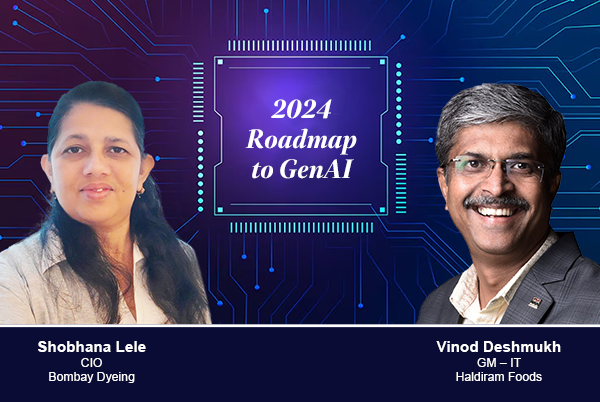Generative AI has made impressive strides in the last one year, taking the technology world by storm. Thanks to consumer- facing tools like ChatGPT, Bard, Claud and the like, there has been a huge perceptional change toward Generative AI – a technology that has been existing ‘silently’ for years!
In fact, Generative AI or GenAI adoption has been faster than that of smartphones and tablets, according to Insider Intelligence.
In the enterprise world, this technology has gained massive interest and acceptance in short order. A Box-sponsored IDC survey shows that two-thirds of executives have already deployed generative AI in some areas at their organizations, which is further evidenced by an IBM survey. About 42% of enterprise-scale companies surveyed by IBM report having actively deployed AI in their business.
But what really lies beyond the hype? Are enterprises reaping real benefits out of their GenAI investments? We asked a few CIOs at the Tech Saga 2024 organized by CIO Klub Pune Chapter.
“Business leaders are enamoured by the success stories of these technologies that often they tend to ignore the failures and the basic requirements that are associated with GenAI’Business leaders are enamoured by the success stories of these technologies that often they tend to ignore the failures and the basic requirements that are associated with GenAI.”
Shobhana Lele, CIO of Bombay Dyeing
2024 – A year of GenAI in production?
2023, which could be considered the watershed year for GenAI, was all about experimentation and pilots, indicate studies. In a recent Gartner poll, about 45% of the 1,400 executive leaders surveyed reported that they are in piloting mode with generative AI. An IBM research estimates this figure to be around 40%. Interestingly, about 10% of them have put generative AI solutions into production and this figure is steadily growing.
A sizable number of the enterprises in piloting mode are expected to shift their focus to practical implementation in the next one year– making 2024 a turning point in GenAI adoption. “For the 40% of companies surveyed stuck in the sandbox, I am confident 2024 will be the year of tackling and overcoming barriers to entry like the skills gap and data complexity.” Rob Thomas, Senior Vice President, IBM Software.
Catapulted by the increasing investments, the GenAI market size is projected to top USD 66.62 billion in 2024 with an anticipated yearly growth rate of over 20% through 2030.
Indian CIOs see more GenAI use cases evolving
Tech leaders in India are bullish about the prospects of the technology. India is already considered a front-runner in the adoption of GenAI, with as high as 81% of Indian organizations already integrating the technology into their operations (Elastic report).
What kind of promising use cases will emerge in 2024? Which industries will get touched the most?
“GenAI use cases will grow quite exponentially in the coming years,” says Shobhana Lele, CIO of Bombay Dyeing, who is a passionate advocate of AI technology. She believes that the healthcare sector is poised to hugely benefit from GenAI.
“Of all the mature use cases that will emerge, I find the technology’s impact on the Healthcare sector quite significant and far-reaching. It’s one sector with massive amounts of data and AI can accelerate use cases that are critical for the whole humanity, helping us find solutions for some of the pressing problems that have been around for decades,” she highlights.
A NASSCOM study from 2023 states that the use of AI and data in healthcare might increase India’s GDP by USD 25–30 billion by 2025.
Vinod Deshmukh, GM – IT, Haldiram Foods is already exploring various use cases of GenAI at the FMCG firm and believes that the FMCG sector stands to benefit significantly from the technology. “There are strong business use cases already emerging, which help FMCG companies improve product quality, predict outcomes, and increase the overall efficiencies,” he adds.
Generative AI in the banking and financial services sector, which is expected to create a massive USD 12 Billion market in the next 10 years, is another great opportunity.
“Strong business use cases of GenAI are already emerging, which help FMCG companies improve product quality, predict outcomes, and increase the overall efficiencies.”
Vinod Deshmukh, GM – IT, Haldiram Foods
“This is another sector that holds huge amounts of personal and sensitive data. AI will be critical in effectively leveraging this data to help consumers get the most out of their assets and investments while devising innovative ways of protecting their critical data,” says Shobhana.
Gen AI is now catalyzing a significant shift in the financial services sector, reports EY, with 78% of the firms implementing or planning Gen AI integration. Around 61% of financial institutions anticipate GenAI to have a profound impact on their value chain, enhancing efficiency and responsiveness, states the EY report.
Banking institutions across the globe are leveraging this technology to improve customer experience, provide personalized marketing and improve collections & recovery. Underwriting copilots are another big use case in the banking sector.
Noteworthy is the fact that sectors that have been slow in adopting artificial intelligence are moving to a more proactive approach when it comes to GenAI.
“GenAI is encouraging many brands to push the envelope – even those who haven’t yet considered AI use cases are exploring the possibilities of GenAI, says Vinod. He cites the example of manufacturing industry. In the manufacturing sector, GenAI will soon be leveraged in quality analysis, decision making and other core areas.”
Less than 20% of manufacturers have begun to implement AI technologies, reports suggest. However, GenAI seems to be moving the needle up, with the global market for GenAI in manufacturing expected to reach around $7 billion by 2032.
GenAI challenges for CIOs
There are several challenges that tech leaders must tackle before they deploy genAI across key business functions. Data privacy and transparency are greater concerns for sure. So are the growing AI ethical challenges which require collaborative work across various stakeholders in the industry.
Limited availability of AI skills is perhaps the top concern for CIOs today, Vinod emphasizes. “Access to the right skillsets is a challenge, especially for businesses in tier-2 & 3 cities. Tech leaders need to develop the right resources and technology capabilities to take this journey ahead,” he adds.
The recent IBM Global AI Index highlights that nearly 35% enterprises report lack of skills for implementation is a big inhibitor for GenAI implementation. One-in-five organizations do not have employees with the right skills in place to use new AI or automation tools and 16% cannot find new hires with the skills to address that gap, the same research shows.
To fill this gap in the current scenario, CIO will be expected to lead the task of reskilling and upskilling the existing workforce – especially because skills in data science, machine learning and MLOps are hard to come by.
All in all, many CIOs want to take a cautiously optimistic path when it comes to taking GenAI to the next level. And reasonably so.
“In my observation, many CEOs are gung-ho about implementing AI or generative AI, whereas the CIOs are a little cautious and apprehensive. There is a reason for this apprehension – Business leaders are enamoured by the success stories of these technologies that often they tend to ignore the failures and the basic requirements that are associated with GenAI,” Shobhana says.
She believes that this perception leads to a lot of pressure on CIOs to start using these technologies with the expectation that it’s going to be successful. “But, every CIO has the responsibility to make the organization aware of AI/GenAI’s basic requirement – the relevant data sets, skillsets and the support. So, it’s a tightrope walk for the CIO,” she sums up.















